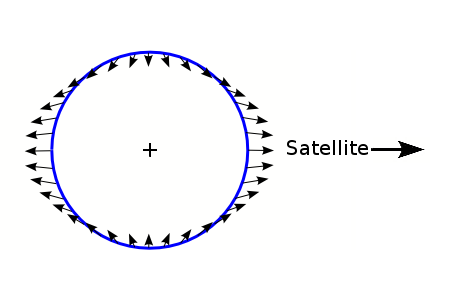Cycles of climate: The Moon
A quick chaser on the Moon ....
 Oceans are 70% of the Earth's surface. Ocean tides are due to differential gravitational pull on the ocean water. The side of the Earth closer to the Moon or the Sun experiences a slightly stronger pull than the side opposite. This gives rise to the familiar "dipolar" or double-bulge shaped of the distorted oceans.
Oceans are 70% of the Earth's surface. Ocean tides are due to differential gravitational pull on the ocean water. The side of the Earth closer to the Moon or the Sun experiences a slightly stronger pull than the side opposite. This gives rise to the familiar "dipolar" or double-bulge shaped of the distorted oceans.Daily and monthly tides. We're all familiar with the rise and fall of ocean tides. They're ripe for Fourier analysis, as they have several periodicities built into them. The first is the daily cycle, caused by the Earth's rotation about its axis relative to the Sun. The next is the monthly cycle of the Moon.
But these orbital motions themselves "wobble" on longer periods. The best-known wobble is the 19-year eclipse cycle, the period of the precession of the Moon's orbital plane. There are longer periods too. If we time-average climate data over a certain period, we remove the effect of cycles with shorter periods; only periods longer than that certain period will survive the averaging process. Thus averaging can remove shorter-term periodicities from raw data.
What about climate? Strong tides tend to pull more cold ocean water up from the depths, exerting a cooling effect on the layer of air in contact with the ocean water.
 There's astronomical cycle worth mentioning, the long-term strengthening and weakening of the ocean tides caused by wobblings of the Moon's orbit. When the tides are strong, very cold water from the ocean depths gets turned over more and brought to the surface. That has a cooling effect on air temperatures at the surface. Conversely, when the tidal overturning of ocean water is weak, less cold water is pulled up from the depths. The air temperatures are not as cooled by their contact with ocean water. The cycle is approximately 1800 years in length and is noticeable in proxy paleoclimate records of ocean temperatures. How much that affects the atmospheric temperature remains an open question.
There's astronomical cycle worth mentioning, the long-term strengthening and weakening of the ocean tides caused by wobblings of the Moon's orbit. When the tides are strong, very cold water from the ocean depths gets turned over more and brought to the surface. That has a cooling effect on air temperatures at the surface. Conversely, when the tidal overturning of ocean water is weak, less cold water is pulled up from the depths. The air temperatures are not as cooled by their contact with ocean water. The cycle is approximately 1800 years in length and is noticeable in proxy paleoclimate records of ocean temperatures. How much that affects the atmospheric temperature remains an open question.Labels: astronomy/space, climate, cycles, Fourier, global warming, moon, paleoclimate


0 Comments:
Post a Comment
<< Home